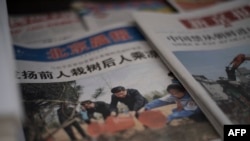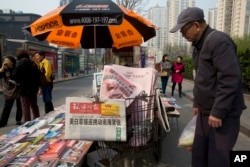That massive leak of records about offshore bank accounts from a Panamanian firm is revealing more information about the affairs of relatives of the Chinese Communist Party's top leadership, including the country's president.
China has moved quickly this week to silence any discussion about the so-called Panama Papers and information about the use of tax havens by the families of at least eight current and former members of the party's Politburo Standing Committee, its top decision-makers. But disclosures by the International Consortium of Investigative Journalists (ICIJ) keep coming.
On Wednesday, the ICIJ said that among those relatives of Chinese leaders who have offshore holdings are: Deng Jiagui, the brother-in-law of President Xi Jinping; Lee Shing Put, a son-in-law of Standing Committee member Zhang Gaoli; Zeng Qinghuai, a brother of former Chinese Vice President Zeng Qinghong; and Li Xiaolin, the daughter of former Premier Li Peng.
Massive wealth accumulated by the families of China’s ruling party members has long been a big concern in China, but also a topic on which discussion is tightly controlled.
While most Chinese publications have been silent about the Panama Papers story, a popular party-backed newspaper, the Global Times, ran an editorial in English and Chinese this week that alleged the massive document dump overwhelmingly focused on non-Western leaders.
According to documents obtained by the ICIJ, Deng Jiagui became the sole director and shareholder of one offshore company in 2004 and two more in 2009. The "shelf companies" — corporations that have no activity — were in the inventory of Mossack Fonseca, the law firm at the center of the document dump. The ICIJ said that by the time Xi Jinping became president in 2013, the companies were dormant.
Deng Jiagui and Li Xiaolin have been mentioned in previous documents that the ICIJ released about offshore holdings.
When asked about the information earlier this week, a Chinese Foreign Ministry spokesman said he had no comment.
In recent years Xi has carried out a high-profile campaign against corrupt officials, publicizing some prosecutions in state media as evidence that the Communist Party is serious about punishing graft. However, authorities also have aggressively censored news stories by foreign publications that explore the overseas investments and financial gains by top officials and their relatives.
On a VOA Mandarin call-in talk show that aired Wednesday, a caller surnamed Peng said, "The saddest thing is the attitude taken by the Chinese government. They tried to cover up, to block the news, in order to 'maintain stability.' Their so-called anti-corruption campaigns are fake, because it is institutional corruption. Officials under this system cannot survive without corruption."
A panelist on the program, economist and news commentator He Qinglian, said offshore accounts are not against the law in China. He noted, "China is concerned about whether the source of the money is legal. What is exposed by the Panama Papers is really just the tip of the iceberg."
Putting money in offshore accounts is not necessarily illegal; such accounts can be used to establish legal tax shelters or ease international business deals. But the report says the documents show banks, law firms and other offshore players often fail to follow legal requirements to make sure their clients are not involved in criminal enterprises, tax dodging or political corruption.
VOA's William Ide contributed to this report, which was produced in collaboration with VOA's Mandarin Service.







